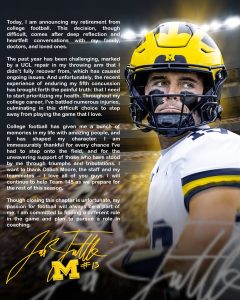Michigan quarterback Jack Tuttle announced his retirement from college football on Monday, citing medical reasons that have ultimately affected his ability to compete. Tuttle’s decision follows a challenging period during which he did not fully recover from an offseason procedure to repair the ulnar collateral ligament in his throwing arm. Additionally, he recently suffered his fifth concussion, a significant concern for his health and future in the sport.
In a heartfelt message posted on X (formerly known as Twitter), Tuttle expressed the difficulty of his decision, emphasizing the importance of family, medical advice, and personal reflection in reaching this conclusion. “Today, I am announcing my retirement from college football. This decision, though difficult, comes after deep reflection and heartfelt conversations with my family, doctors, and loved ones,” he wrote.

Tuttle’s football journey has been marked by ups and downs. He played four seasons at Indiana before transferring to Michigan, where he spent two additional seasons. His time at Michigan included limited game action, as he appeared in two games during the 2024 season. Tuttle completed 30 of 50 passes for 306 yards, with one touchdown and two interceptions. He played a crucial role when called upon, including a relief appearance against Washington on October 5 and a start in a challenging game against Illinois on October 19, which the Wolverines lost 21-7.
Throughout his career, Tuttle demonstrated resilience and determination. He faced adversity with injuries that hindered his performance and, ultimately, his ability to contribute at a high level. The decision to retire reflects a growing awareness of the long-term implications of repeated injuries, especially concussions, which have become a critical focus in the world of sports.
As he steps away from the game, Tuttle has expressed a desire to remain involved in football, stating his intention to pursue a coaching career. This move allows him to share his knowledge and experiences with future generations of players while staying connected to the sport he loves.
Tuttle’s retirement comes at a pivotal moment for the Michigan Wolverines, who currently sit at 5-3 with a 3-2 record in the Big Ten. The team has seen multiple quarterbacks take the field this season, with Davis Warren recently reclaiming the starting position. As Michigan prepares to face No. 1 Oregon this Saturday, Tuttle’s absence will be felt, but the team is determined to continue its pursuit of success.
The decision to retire is a poignant reminder of the physical and mental challenges athletes face, especially in contact sports like football. Tuttle’s journey underscores the importance of health and well-being over competition. As he transitions to coaching, he will likely emphasize safety and awareness regarding injuries, hoping to foster a culture that prioritizes the well-being of young athletes.
Jack Tuttle’s retirement marks the end of a chapter but opens the door to new opportunities in coaching, where he can impact players’ lives and careers positively. His commitment to the sport and its future remains unwavering, and he will surely bring valuable insights to his future endeavors.



